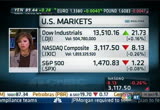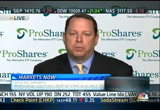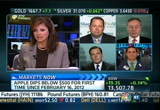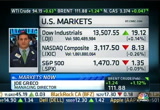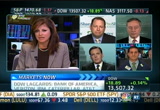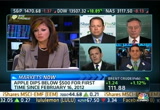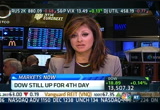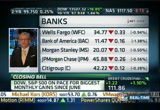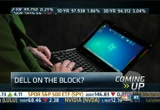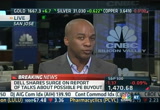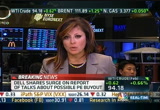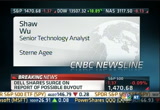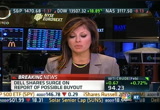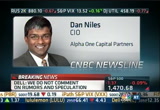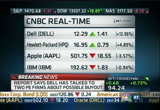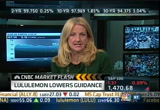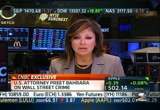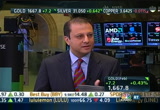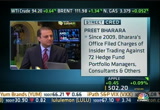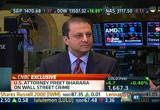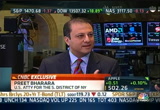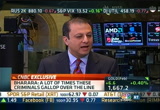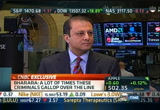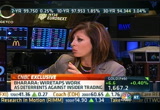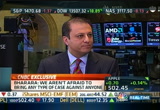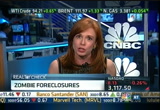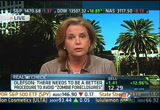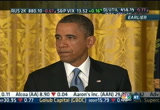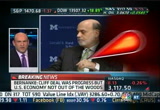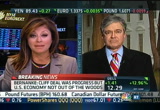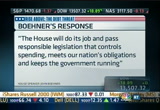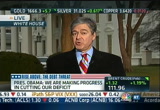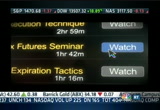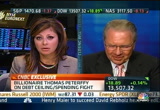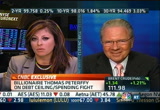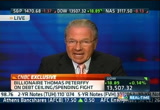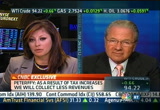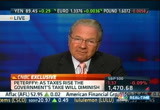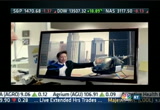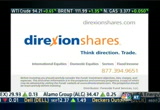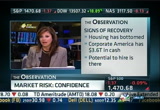tv Closing Bell With Maria Bartiromo CNBC January 14, 2013 4:00pm-5:00pm EST
4:00 pm
you'd chase a stock like that. >> maybe that's not my style. it has some credence too it otherwise it wouldn't see that. you can't trade anything on that. going forward. you're going to wait and see what they come out with going forward. right now not touching it. >> you're skeptical of this market anyway, but when you get deals like that does that suggest somebody sees value there? >> it's surprising to see it in dell. we had the president talking today. more bipartisan politics, you know. i'm just not a believer in that. i think that's the overhang of this market. i'd like to see the deals done. creates headlines but that's about all it is. >> good to see you. thank you for being with us. we're coming off the lows of the day. stick around. we're going to get more insights from a very savvy analyst on whether this dell rumor is true or not. and what it says about the technology industry and the pc market as well.
4:01 pm
4:05 pm
4:06 pm
let me does you, tim hollands, how are you putting work to be in this environment? what kind of year do you expect it to be? >> we don't have price on the dow, but we continue to look at more domestic-facing companies and industries, so consumer finance are big parts of both portfolios. we think housing continues to improve, consumer continues to delever, monetary policy remains supportive, so stock-pickers, we own redwood trust, which is a mortgage reit investment jumbo. we own carmax. they invented the used car superstore, lots of growth left there. and then a final stock would be ko colfax, which we do a great job as the vascular system for the global economy. they build large fluid systems for petrochemical companies, energy companies, as the economy comes in, as industrial production comes back, they're well positioned. so, we're pretty constructive on the asset class, particularly because a lot of people don't
4:07 pm
seem to be all that constructive on the asset class. >> steve sax, what about you? where are you seeing the flow? what are investors particularly grav stating towards these days? >> it's till equities and all of last year, credential the first couple weeks of this year, more in particular, though, small caps and midcaps. we've started to see them out-perform large caps. that was the story of 2012, with particularly the mega caps. so, if you look at the russell 2000, the mid cap 400 versus say the s&p 500, we've not only seen more flows in those areas, but we're actually seeing the out-performance, which is also a theme i think probably continues, certainly in the first half of this year. fundamentals are really strong in u.s. equities, and that translates well given the current macro environment into the small and mid caps in particular. >> all right, we'll leave it there. great conversation, appreciate your time and see you soon. >> thank you very much. now a big move for stocks today. the dow made things more interesting. bob pisani has winners and losers on the session. >> was dell a big story in the middle of the day.
4:08 pm
we popped up to well over $12. of course, you heard the news, reportedly in buyout talks with private equity firms, touching off a bit of a frenzy. 70% of their revenues are pcs. that's a declining business. overall, a lot of the speculation around dell has been about splitting the company into a pc and an enterprise business. that's the growth area, enterprise, but they've had limited success in growing that enterprise business. let's move on. techs generally on a down side today. hewlett-packard came up in sympathy with dell, but apple had a tough day, did not close below $500, but big volume. all of the other big names generally on the down side. how about the rest of the market? it's very traditional for banks to trade down after the first earnings report. we had that from wells fargo on friday. good, but not great. here we've got a typical trading day, the day after the first reports with wells, bank of america, morgan stanley, jpmorgan to the down side. jpmorgan and goldman, though, are on wednesday. how about the s&p? it's been a great year so far.
4:09 pm
the s&p is up 3%. the leadership is very broad -- health care, financials and materials are the market leaders. you can't get a broader advance than that for the overall markets. finally, maria, we have an ipo tonight, master limited partn partnerships are hot, hot, hot. usa compression partners make natural gas compression services. the important thing, these mlps pay out juicy dividends. maria, this is an 8% dividend yield for this company. two others are going public. this will be pricing tomorrow right down here at the new york stock exchange, and i'll be here. maria, back to you. >> a lot of action. like that ipo deal flow. thanks very much, bob. we'll check in later. dell posting the biggest gain in 12 years today, fueling the rise of a report that the pc-maker is talking with private equity firms about going private. technology reporter jon fortt on the story with the latest and if this could happen. later, wall street's top cop, preet bharara will sit down with me for an interview only here on "closing bell." we'll talk insider trading,
4:10 pm
cyber crime and a lot more. also ahead -- >> americans will have come from people striving for success. take away incentive in marketing success and you take away the wealth that helps >> this ad about the dangers of socialism makes a big splash before the election, right? it didn't sway the outcome. now the billionaire behind the ad has the latest to say in the brawl in washington. back in a moment.
4:11 pm
4:13 pm
welcome back. this was the stock of the day today. dell spiked after reports the company is in talks with private equity firms. >> it would rank among one of the top of all time. rumor has it that several large banks have been contacted on the possibility of taking dell private. dell says it won't comment on rumors the stock is up 13% into the close.
4:14 pm
the underlying issue here is the pc ecosystem. dell was the poster child for that. and the pc ecosystem is now falling apart. global sales were down 8% in q3. then again 5% in q4. dell pcs were half of revenue last quarter. laptops down 26% last quarter. desktops down 8%. what's the road in turning things around? networks, servicers, have been doing well for dell. it's not clear it would grow any faster. >> stick around. joining me now on the phone is dan niles. along with shaw woo. good to talk with you gentlemen. dan, what's your take on this dell story? >> i mean, i think it's something that's been talked about for awhile. you can go back to actually 2010
4:15 pm
in june and michael was at a conference and somebody asked him do you ever think about taking your company private? and the answer was yes. there's been this talk for a long time. was one of the ten worst performing stocks in the s&p last year. it was one of the top ten cheapest though. if you're looking at it from that perspective, the timing seems to make sense. >> so let me ask you, shaw, what you think. how would shareholders work out in this deal? >> well, you know, i agree with dan that this rumor's been going around for awhile. but i think the biggest problem is that the size of dell. you look at the stock today. it's -- the market cap's now $21 billion. so in the takeout, it would have to be a premium to that. possibly $30 billion. that's a lot of capital to raise. a lot of debt financing. so we think because of the size
4:16 pm
of this deal the likelihood of it happening is not likely. >> so what happens to dell if it doesn't happen? >> you know, the company that the key thing is at the end of the day about 70% of its business is tied to pc. that includes desktops, laptops. but also part of it is services and software business. right? that's also like hep desk, pc break and fix. that's not enterprise really. that's pc-type. 70% of the company is in secular decline. and 30% of the company is working. that's the problem. a lot of the company is still under structural and secular pressure. >> dan, do you agree with that? let me ask you what the fate of dell is if it's not acquired. we see what's happening with apple. it's become the monster leader in the business. hewlett-packard for awhile
4:17 pm
considered putting it on the block. mobility is taking over. did dell miss mobility, is that what happened? >> yeah. i mean, i think there are a lot of questions. yeah, that's a really big problem for dell is they didn't catch the move to smart phones. and they missed the move to tablets. when you look at the pc industry in total, it's under structural pressure for probably the next few years and for dell until they sort of get that figured out and find a way to start growing their business again. but, i mean, there's two pieces you have to remember is that one, it's the business. the second part of it is what's the valuation? and the biggest piece is probably what's michael dell who owned 50% of the company, what's he want to do? i find it interesting with all the special dividends issued last year guys that own big portions of their companies that pulled in a bunch of dividends into 2012. >> right. >> dell didn't do that. and michael owns almost 60% of
4:18 pm
the company. you've got about $3 billion in cash sitting on the balance sheet. there's sort of a difference between what you think structurally is going on and what are you paying for. for us we look at $15 a share to $16 which is sort of a level you could make a valuation for. where you say 70% of the business is just pc-related. maybe i stick a .2 multiple on it. but also got $5 billion in cash. and enterprise profits of another billion and change. you can kind of get there. and you have to remember there's a private equity firms out there with a lot of capital that they are trying to figure out how to put to work. and this is one of the ten cheapest stocks in the s&p 500. so i agree with shaw. the business is tremendously challenged. i did mna early on in my career, and what ends up happening on a deal structure. it's often the motivation of the players involved. >> right. well, that makes a lot of sense.
4:19 pm
jon fortt, wrap us up here. tell me where you see dell going. where does the growth come from if not by private equity? >> well, it comes from the enterprise side. it comes from acquisitions. i'll point out hp has actually been in tougher shape than dell lately. this isn't just a story. other companies out of the ecosystem have these tough decisions to make about how they're going to be structured going forward. >> yeah. we should point out dell has a big corporate business. so it's not just, you know, pcs. michael dell will say he's got a bigger business than just pcs. gentlemen, thank you. we'll keep watching this story. certainly was a talker on the street today. let's get to mary thompson now for breaking market news. >> we're looking at lulu lemon down after the last quarter. the revenue looks to be light. analysts were look for 489. same store sales in the high single digits. we're expecting same store sales to be 10%-plus.
4:20 pm
one last thing on revenue, the growth there would mark the first time since below the 30% rate for some time. so that's putting pressure on its stock. you can see there in the after-hours session down about 7%. back to you, maria. >> we'll leave it there. thank you so much. up next, a huge shoutout from one boss to another. >> one, two, three! >> that was bruce dedicating his song death to my hometown about the economic process. preet bharara speaks with me next. he's got the reaction to the shoutout. and a lot more. don't miss that exclusive coming your way next. also ahead, the hungarian born billionaire who spent millions of his dollars a ahead
4:22 pm
nothing. are you stealing our daughter's school supplies and taking them to work? no, i was just looking for my stapler and my... this thing. i save money by using fedex ground and buy my own supplies. that's a great idea. i'm going to go... we got clients in today. [ male announcer ] save on ground shipping at fedex office.
4:23 pm
with scottrader streaming quotes, any way you want. fully customize it for your trading process -- from thought to trade, on every screen. and all in real time. which makes it just like having your own trading floor, right at your fingertips. [ rodger ] at scottrade, seven dollar trades are just the start. try our easy-to-use scottrader streaming quotes. it's another reason more investors are saying... [ all ] i'm with scottrade. welcome back. wall street's top cop taking a hard line against white collar crime. claiming it extracting $3 billion in criminal forfeitures last year alone. some say he's overreaching. others say he's not going far
4:24 pm
enough. claiming no big names from the 2008 financial crisis has been prosecuted criminally. joining me now is preet bharara. mr. bharara, great to have you on the program. >> thanks for having me. >> is wall street safer since you took office in 2009? >> you know, i don't want to take any kind of credit just from my office. i think that people understand that when significant prosecutions are brought and aggressive prosecutions are brought that that makes people feel a bit all right about whether or not things are happening in a fair way. all of this going on here is an incredible part of america and an incredible part of commerce in america. people need to understand and appreciate all that goes on here is happening in a fair way and that the rules are the same for everybody and no one's above the law. we try in my office to make sure that's true. >> do you think people realize that, though? because i feel like the individual investor has left. they feel like the game is
4:25 pm
rigged. they feel they're not getting a fair shot. it's too fast, the electronic trading gets away from them. what is it going to take to get that confidence back on the part of middle america that wall street is not evil? that what goes on here is a level playing field. >> i think a lot of things have to happen. people in the business have to do a better job of ethics and integrity in investing. and make sure they make that a high priority. then the part that regulators and law enforcement folks play is to make sure that we bring the cases that are appropriate to bring and get the convictions that are appropriate to be gotten. and over time i think people appreciate that when you've been doing it for not just a month or two years or three years that people will feel more confident coming back into the market. because they believe people will be held to account. >> which is why you have been praised over your handling of bernard madoff, taking him and his ponzi schemers down. that was a big portion in
4:26 pm
forfeitures for 2012. >> yes. but there's a lot more beyond that. at a time when people denigrate government and whether or not a dollar spent on some aspect of the government makes sense or not, our budget is about 50 million bucks. we brought back $3 billion. which is better than others at the exchange get. >> that's a pretty good return by anybody's measures. but you know you bring up an important point. with dodd frank and with so many more institutions that the s.e.c. is going to have to look at, your work has obviously been piling up. the s.e.c.'s work, the fbi's work. do you have the resources you need to conduct and do your work property? it seems you're all squeezed. do you have the right personnel that understands some of these complex securities your dealing with and do you have enough people? >> look. i don't have an army. and the white collar enforcement area i have what you can refer
4:27 pm
to as a s.e.a.l. team of really dedicated smart lawyers and investigators. as does the s.e.c. and fbi that work on these matters. i think they're as smart as you can get in this country. we can always use more, but i think people are spending the time and dedicating their time to get the job done. >> what pockets of financial services have you found to be the most aggressive. people talk about hedge funds being very aggressive and we all know there's the wagons circling around steve cohen. can you tell me about that case? >> i don't talk about particular cases ever. >> okay. in terms of the areas of financial services in which you -- that skirt the line, if you will. can you name areas that you think are more aggressive than others? >> there's nothing wrong with being aggressive. the problem is when people think that they can get as close to the line as possible and they aspire to the minimum, just staying over the line. there are too many people who get the wrong message and then cross the line. a lot of times they gallop over
4:28 pm
the line. and that's where we come in. part of the disheartening thing of the insider tradingases we brought over the last years is you're finding that misbehavior in a lot of sectors. not just trading firms but also inside companies. but the problem is it's all over. we have to make sure the enforcement efforts address all of it. >> you stepped up your efforts. you've become more sophisticated and aggressive. for instance, the wiretapping. everybody wants to know about that now. it's scary. is everybody on wall street being listened to? are you using mafialike tactics to listen? >> i didn't invent it. >> it works. >> it does work. part of the reason it works as might be clear, it helps us to convict people who deserve to be convicted in court. but the other thing i think your question gets to is it makes
4:29 pm
people have some concern. it allows us to establish one of the main issues of law enforcement which is deterrence. people who are watching and are on a position to trade insider information have to worry their phones are being listened to, that their friends are actually potentially government witnesses or can become government witnesses. if they have to worry about those things, i think it causes them to think not just once or twice, but three times or four times before they follow in the foot skeps of a lot of people who've gone to jail in the last few years. >> let me ask you about the last few years. there's a lot of people saying look, i lost all my money. i lost my 401(k). i lost my house and yet nobody has gone to jail for it. no one has been taken down as a result of the 2008 financial crisis. is it hard? is it too difficult to actually identify and say this was fraud? you can't prosecute stupidity. is that what we're dealing with? >> fact of the matter is, a lot
4:30 pm
of people have gone to prison. with respect to the question of whether or not a certain executive has gone to prison, i will tell you there are people in my office and s.e.c. and fbi who are working very, very hard to bring cases that are appropriate to be brought. one thing the public should understand is we're not afraid of anyone. we're not afraid of bringing any case against anybody no matter how big they are. sometimes it takes time to get to them. sometimes it takes a break in the case. sometimes things are junegligen and stupid. people can rely on information from their accountant or lawyer. we're not done yet. >> are we still in the middle of the mortgage fraud? will there be bigger blowups to come there? or is there another area you're particularly interested? >> we're interested that that area and all others. something that i've been talking about a little bit in the last
4:31 pm
year or two as other people have been is the threat of cyber crime. it's something that ordinary americans can be effected by and corporate americans could be. >> how do you control cyber crime? >> you've got to make an effort. there's a law enforcement part and a piece to be played. and the fbi and other agencies need to step up and become more sophisticated. but also companies need to be individual levigilant about it . in the old days no one would have thought twice about reporting about a robbery that happened the traditional way with a note and gun and mask. yet those kinds of things are happening all the time. people are fraudulently taking money out of banks and stealing people's account information on a regular basis and we're sometimes finding that institutions are not reporting them to the authorities as they have before. that's a mistake and it hurts all of us. >> and they're doing it through money noouchlts online? >> the internet is an amazing
4:32 pm
thing but it can help people commit crime. you're going to see us bring more aggressive cases along those lines in the future. >> final question here. a lot of people talking about eric holder. would you be interested in that job? >> i love my job now as you love yours. >> good to have you on the program. thank you for your time tonight. battle over the debt ceiling and spending cuts. jon harwood will recap the latest war of words doming up next. then words from the billionaire executive who says we need to watch out for creeping socialism into the country. he was born in hungary and he sees a lot of warning signs. plus nightmare on housing. so called zombie homes. what are they? this will shock you. back in a moment. [ male announcer ] you've climbed a few mountains during your time.
4:33 pm
4:34 pm
4:35 pm
welcome back. zombie homes, have you heard of this? diana olick tells us what they are and how they can impact your property value. >> they are foreclosures that never happen. that borrowers defaulted on the loan, the borrowing vacated but then the bank never followed through because the home just wasn't worth it. some end up looking like these
4:36 pm
in suburban maryland. abandoned and vandalized lowering property values all around them. now here's the twist. under last year's $25 billion mortgage settlement, the one between big banks and state attorneys general over so-called robosigning, if a bank decides not to fore close, it must extinguish the mortgage entirely and notify the homeowner they own the home free and clear. that went into effect last october which is why we're seeing more abandoned homes. we're also seeing more borrowers who had no idea they got to keep the home because they either walked away on their own or thought they had to move. so nobody was around to get the letter from the bank saying it's all good now. thousands of mortgages have and will be extinguished. these are in the nation's very worst neighborhoods. let's remember that. but still some homeowners find that they owe back property taxes and maintenance fines on a home they thought they'd lost. maria? >> all right, diana.
4:37 pm
stay there. we want to get reaction now within real estate from real estate attorney sherry oliphson. good to see you. >> thanks. >> should a process be in place to avoid the zombie foreclosures? >> well, absolutely. i mean, we've learned through this crisis that foreclosure litigation is unlike any other litigation. we have time frames as a result of the robosigner and others that diana referenced for banks to complete short sale processes and notification requirements 37 and these other requirements if foreclosures are not going to be pursued need to be enforced. not only for the homeowners but also for the neighbors and for investors in those banks. we're talking about as many as 2 million mortgages that are in zombieland. who knows what financial impact that's going to have when it shows up on the bank's books? >> sure which is what diana was reporting. should the banks have a time limit to decide foreclosed or
4:38 pm
notify the homeowners? >> they should have a time limit in deciding not to fore close. i contacted the mortgage settlement and the overseers. they said there is no actual timeline. once they do decide not to fore close, then they have to tell. these homeowners have no idea. a lot of them don't understand the process. they get one notice and think they're out. they don't know the difference between a default notice and eviction notice and they leave thinking they lost the home. then to find out a year later they're still the homeowner and they're legally liable for all this. >> of course. sherry if a homeowner ends up not being foreclosed, they thought they were. they've left the home but they still own it, could they sue the bank for the fees and damage to their home? >> well, the banks have an obligation to mitigate their losses. that would include these losses. the damage and back real estate
4:39 pm
taxes. but these are folks who don't have resources and have the wherewithal to go through something like that. but it's important for any homeowner who thinks they've been foreclosed to check dhe records where they live and make sure they were. if they're not clear on it, contact the bank and find out. it's a whole different world now no terms of negotiating with your bank than it was when the folks walked away three or four years ago. >> thanks very much. we'll keep watching this. this is certainly an important story to follow. we'll see you soon. up next, the president throwing down the gauntlet to republicans on the looming debt ceiling crisis. >> the full faith and credit of the united states of america is not a bargaining chip. and they better choose quickly. >> i'll get reaction from billionaire founder and ceo of interactive brokers, peterffy. ] you are a business pro.
4:40 pm
omnipotent of opportunity. you know how to mix business... with business. and you...rent from national. because only national lets you choose any car in the aisle. and go. you can even take a full-size or above. and still pay the mid-size price. i could get used to this. [ male announcer ] yes, you could business pro. yes, you could. go national. go like a yes, you could. i've always had to keep my eye on her... but, i didn't always watch out for myself. with so much noise about health care... i tuned it all out. with unitedhealthcare, i get information that matters... my individual health profile. not random statistics. they even reward me for addressing my health risks.
4:41 pm
so i'm doing fine... but she's still going to give me a heart attack. we're more than 78,000 people looking out for more than 70 million americans. that's health in numbers. unitedhealthcare. office superstore ink retailer in america. now get $6 back in staples rewards for every ink cartridge you recycle when you spend $50 on hp ink. staples. that was easy. ♪ ♪ ♪ [ male announcer ] some day, your life will flash before your eyes. ♪ make it worth watching. ♪ the new 2013 lexus ls. an entirely new pursuit.
4:42 pm
welcome back. breaking news right now from ben bernanke on the debt ceiling. over to you, steve. >> thank you very much. ben bernanke commenting on the fiscal cliff. saying there was progress there but the u.s. economy and the theretos from the fiscal debate, the u.s. economy is not out of the woods yet. raising the debt ceiling, he
4:43 pm
said, gives the opportunity to spend now. like a family trying to raise its credit rating not deciding to pay bills. we think we're getting some effect in lowering interest rates but it's still early yet to tell. we have found qe to be an effective tool. we will continue to assess how effective. just before you came to me he was asked one of the criticisms. aren't the fed quantitative policies overspending by congress. the chairman saying it's not the fed's job to play games and make congress do what it should be doing on its own. >> he keeps saying this in so many words. you'd think people would get it at this point. thank you so much. >> you would think, yeah. >> steve leisman. president obama telling republicans to move quickly on the debt ceiling. jon harwood on the president's main theme at his news conference today. >> his main theme was to draw a brighter line with republicans in that fight over the debt
4:44 pm
ceiling. republicans saying we want dollar for dollar spending cuts. the president said i'll talk about spending decreases. but i'm not going to hold the u.s. economy hostage. here's the president. >> they will not collect a r ransra ransom in exchange for not crashing the american economy. the financial well being of the american people is not leverage to be used. the full faith and credit of the united states of america is not a bargaining chip. and they'd better choose quickly because time is running short. >> and house speaker john boehner responded quickly saying the house republican majority will do the responsible thing. will make sure the nation meets its obligations, will keep the government running. that's trying to take that specter of the government shutdown off the table. we've got a real confrontation brewing because the president says i'm going to break the
4:45 pm
habit of crisis-driven fiscal negotiations. and if he succeeds in that, somebody's going to have to break. we're going to find out pretty soon. because the debt ceiling could be hit in as little as one month from now. >> it's interesting that we still haven't had any ideas, though, on spending cuts, john. it seems like the gloves are always on. but in terms of the plans to actually cut spending, have you heard anything like that? >> well, the president had spending cuts outlined that get most of the way there in the offer that he made to boehner. he -- both sides were looking for greater level of specificity on entitlement programs. but the president said today if they don't like what i laid on my table to boehner, i invite them to pass a proposal through the congress. that's difficult to do because as you know, neither party is very eager to take a cleaver to medicare or social security. republicans more willing to cut medicaid, but the president's
4:46 pm
not. >> all right. we'll leave it there. thanks so much. john harwood. we have more breaking news from washington now. over to eamon javers. over to you. >> hi, maria. we've got a new letter here from tim geithner. the letter going to speaker of the house john boehner. along the points that john was just making in terms of the debt ceiling. the treasury secretary now saying he expects to exhaust the extraordinary measures used to fund the government now between mid-february and early march of this year. a bit of clarity on the time frame. treasury secretary coming down pretty hard here on what the effects would be of not raising the debt ceiling saying even a temporary default with a brief interruption in payments that congress restores would be terribly damaging. calling into question the willingness of congress to uphold america's long-standing commitment to meet obligations of the nation in full and on time. default would increase borrowing costs and therefore add to
4:47 pm
future budget deficits. this letter from the treasury secretary intended to put more political and public pressure on congress to do something on the debt ceiling. so we're seeing the administration across the board acting in a very conservative way today. >> thank you very much. up next, he spent millions of his own money warning about dangers of socialism. now the next crisis in washington. tom peterffy will join me next. ♪ [ cows moo ] [ sizzling ] more rain... [ thunder rumbles ] ♪ [ male announcer ] when the world moves... futures move first. learn futures from experienced pros with dedicated chats and daily live webinars. and trade with papermoney to test-drive the market. ♪ all on thinkorswim. from td ameritrade.
4:48 pm
with the spark cash card from capital one, sven gets great rewards for his small business! how does this thing work? oh, i like it! [ garth ] sven's small business earns 2% cash back on every purchase, every day! woo-hoo!!! so that's ten security gators, right? put them on my spark card! why settle for less? testing hot tar... great businesses deserve great rewards! [ male announcer ] the spark business card from capital one. choose unlimited rewards with 2% cash back or double miles on every purchase, every day! what's in your wallet? here's your invoice.
4:50 pm
welcome back. he spent millions of dollars of his own money warning about the dangers of socialism and tried veering voters away from president obama. what does he have to say now he won and they can't come to agreements on spending? tom peterffy is with me. thank you for joining us. >> thank you for having me. >> what changes have you made since the president has been re-elected? did you change your staff? >> i want to put the inflammatory rhetoric aside and look at where we are today. so the republican leadership agreed to tax rises without spending cuts in the hopes they'll be able to keep the
4:51 pm
questions of taxes out of future budget negotiations. this is not likely to work out. the president doesn't seem to show the slightest interest in reducing spending other than in the area of defense and maybe means testing for entitlements. so, chances for meaningful reduction in the growth of entitlements on the part of the republicans is almost nil. >> well, i mean, what -- what could the republicans have done? the senate didn't approve their own plan until, what, midnight on new year's day and it -- they will say, the republicans will say they were up against the wall and didn't want the country to go over the fiscal cliff. should we have gone over the fiscal cliff, since that was the reality, if, in fact, they would have pushed for spending cuts? >> maria, i'm not about to
4:52 pm
second guess them. these are very smart people -- >> well, you are second guessing them. this is what this interview is about. >> i just like to state where i believe where we are and what's going to happen. >> okay, what do you think happens? >> so, i think that the -- as a result of the tax increases, we are going to collect substantially less revenues than we thought we would. and that is because the federal and local tax rates, marginal tax rates combined in high tax states are not on high income taxpayers are now in the neighborhood of 50%. in my home state of connecticut, it's 48.5%, in new jersey and new york, it's higher. and in california, it's higher again. >> right. >> and 50% is well past the peak of the curve, meaning that as production rises -- as taxes
4:53 pm
rise, production diminishes. so, when taxes go to 100%, production goes to0 and the government collects nothing. >> right. >> so, as taxes rise, the government's stake will diminish. and the government's stake is maximized somewhere between 40% and 45%. and we are beyond that. so, the government's stake is going to diminish from here on, so raising taxes is no longer going to be an answer to deficit reduction and apparently neither is cutting spending. >> yeah, i mean, i guess, you know, the broad -- the broad populous, you know, the people, i don't know that they necessarily understand the implications of not cutting spending, because it does feel
4:54 pm
like, you know, it constantly goes on the republicans that the republicans, you know, are bad and the gop, you know, and sort of between the media and sort of the talking points, that's what the broad populous seems to believe. so, how do you ensure that everybody understands the implications of the fact that you raise tax, we have a slow economy, you get less tax revenue, you're still not doing anything for the debt. how do you communicate that message? >> i don't think that -- i don't think i can do that and i don't think that anyone can successfully do that, given that the two sides are trying to push different points of views. and the people in between have no idea who is right. so, anyway, i think that since we cannot raise taxes and cannot cut spending, we are in a box and our only way out of that is rapid inflation. >> and you think -- you think that's where we're going? >> that's exactly where we are
4:55 pm
going. and this is not -- this is not only a u.s. problem, this is a situation that's pretty similar in europe, in china and japan. so, we are entering an area of global inflation. >> yeah, yeah, it's really an important discussion to have. tom, thank you very much for being on the program. i hope you'll come back soon to continue this discussion. tom peterffy. coming up, my thoughts on one of the biggest risks in the market. kvd confidence in the u.s. government. that's next. . . . what's next?
4:56 pm
he's going to apply testosterone to his underarm. axiron, the only underarm treatment for low t, can restore testosterone levels back to normal in most men. axiron is not for use in women or anyone younger than 18. axiron can transfer to others through direct contact. women, especially those who are or who may become pregnant, and children should avoid contact where axiron is applied as unexpected signs of puberty in children or changes in body hair or increased acne in women may occur. report these signs and symptoms to your doctor if they occur. tell your doctor about all medical conditions and medications. do not use if you have prostate or breast cancer. serious side effects could include increased risk of prostate cancer; worsening prostate symptoms; decreased sperm count; ankle, feet, or body swelling; enlarged or painful breasts; problems breathing while sleeping; and blood clots in the legs. common side effects include skin redness or irritation where applied, increased red blood cell count, headache, diarrhea, vomiting, and increase in psa. see your doctor, and for a 30-day free trial, go to axiron.com.
4:57 pm
4:58 pm
and finally today, my observation on confidence in government. specifically, our government. we all know it is extremely difficult to call a bubble when you are actually in a bubble. and equally difficult to navigate fiscally when we move from one manufactured crisis to another. much has been said about this economic recovery. the positives, of course, include housing, which seems to have bottomed and the corporate sector, sitting on $3.6 trillion in cash, giving business great potential. and i emphasize to sensual to hire new workers. so, what, if anything, would have the potential to create the kind of market disruption or
4:59 pm
chaos similar to what we saw back in 2008 and take this recovery offtrack? where is the risk of a market selloff? of course, it is all about confidence. sure, there are signs of a global slowdown and yes, we have dysfunction and disagreement in washington. seems like we've seen these stories before. but what is different this time around? it's confidence in government. for the first time, we are actually seeing consumers, institutions, ratings agencies and many constituents all over the world questioning the credit of certain developed countries. now, we have our own worries with the debt ceiling approaching. here is what the president said today. >> markets could go haywire. interest rates would spike for anybody who borrows money. every homeowner with a mortgage, every student with a college loan. every small business owner who wants to grow and hire. it would be a self-inflicted wound on the economy.
246 Views
IN COLLECTIONS
CNBC Television Archive
Television Archive  Television Archive News Search Service
Television Archive News Search Service 
Uploaded by TV Archive on

 Live Music Archive
Live Music Archive Librivox Free Audio
Librivox Free Audio Metropolitan Museum
Metropolitan Museum Cleveland Museum of Art
Cleveland Museum of Art Internet Arcade
Internet Arcade Console Living Room
Console Living Room Books to Borrow
Books to Borrow Open Library
Open Library TV News
TV News Understanding 9/11
Understanding 9/11

